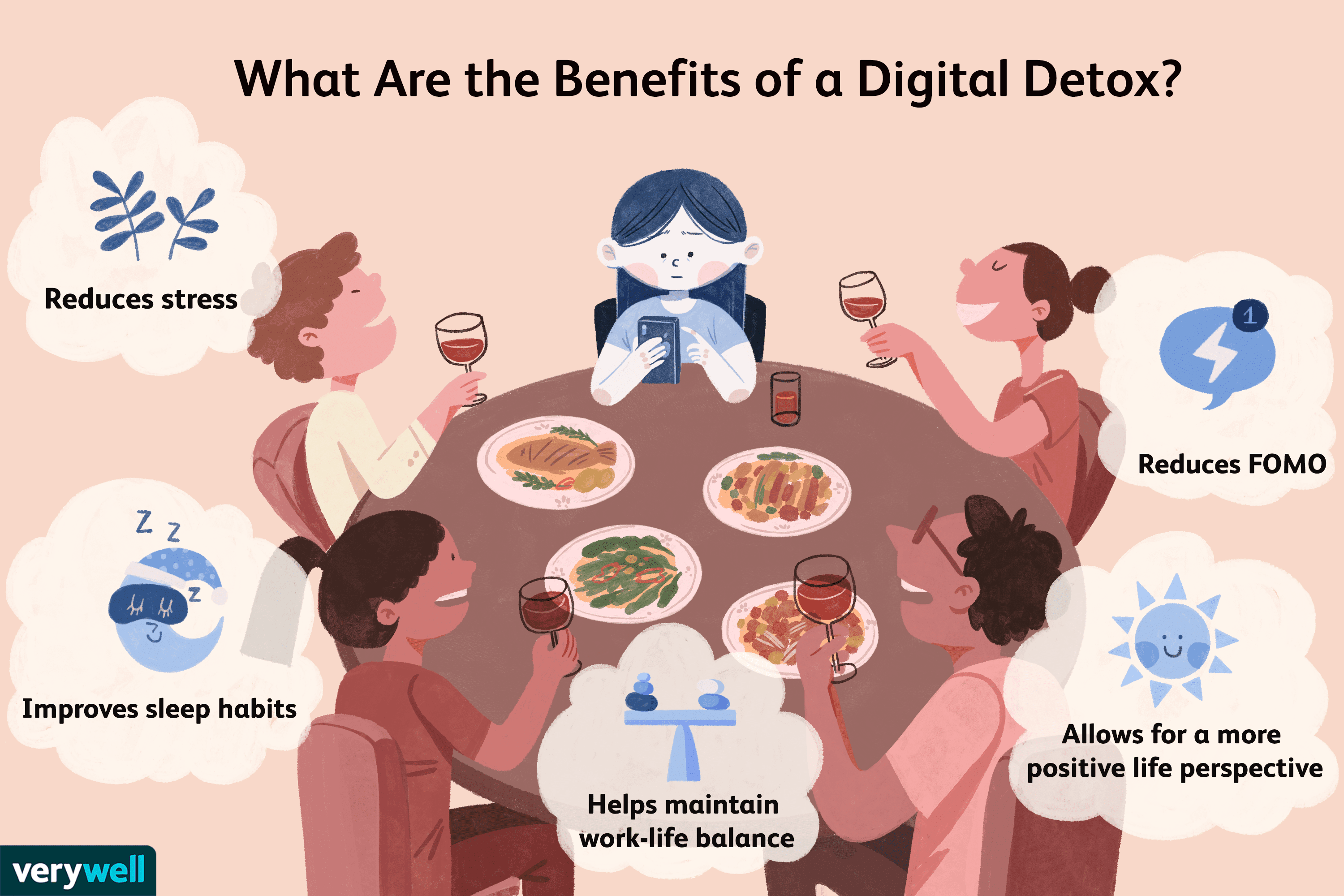Signs You Need a Digital Detox: Reclaim Your Mental Clarity and Well-being
In today’s digital age, it’s nearly impossible to avoid technology. From smartphones to laptops, tablets, and social media, we’re constantly bombarded with notifications, emails, and updates. While these tools are meant to make our lives easier, they can also lead to overload and mental fatigue. If you’re feeling disconnected, overwhelmed, or stressed, it might be time to consider a digital detox.
A digital detox refers to a period of intentional disengagement from electronic devices, allowing you to regain control of your time, focus, and mental well-being. In this article, we’ll explore the common signs that indicate you need a digital detox, and how taking a break from technology can significantly improve your quality of life.
:max_bytes(150000):strip_icc()/why-and-how-to-do-a-digital-detox-4771321-FINAL-d129381fa4524c5db792951fd9b987d2.png)
Why Is a Digital Detox Important?
Before diving into the signs you need a digital detox, it’s essential to understand the importance of disconnecting from technology. While technology provides numerous benefits such as convenience, connectivity, and entertainment, it can also lead to stress, anxiety, and even addiction when overused. A digital detox can help you:
- Reduce mental clutter and increase focus
- Improve sleep quality by reducing exposure to screens
- Strengthen relationships by fostering real-world connections
- Regain emotional balance and reduce stress
- Improve physical health by encouraging more offline activities
Now that we’ve established why a digital detox is crucial, let’s look at the signs that indicate you may need one.
1. Constantly Checking Your Devices
One of the most apparent signs you need a digital detox is the habit of constantly checking your devices, even when you don’t need to. If you find yourself repeatedly unlocking your phone or refreshing your social media apps throughout the day, you’re likely caught in the cycle of digital addiction.
How to Break the Cycle:
- Set specific times during the day to check your phone or emails
- Use apps that limit your screen time or block access to distracting apps
- Turn off non-essential notifications to reduce temptation

2. Feeling Anxious or Stressed from Technology
If you feel anxious or stressed after spending extended periods on your devices, it’s a strong indicator that you need a digital detox. Constant exposure to social media, emails, and the news can overwhelm your mind and increase stress levels. The constant flow of information and comparison on social media can also trigger feelings of inadequacy and FOMO (Fear of Missing Out).
How to Manage Stress:
- Limit social media usage and curate your online feeds to only follow accounts that uplift and inspire you
- Take regular breaks to step away from screens and engage in mindfulness practices like meditation or yoga
- Prioritize face-to-face interactions and offline social activities
3. Trouble Sleeping at Night
Struggling to fall asleep, or waking up feeling tired and unrested, may be a result of too much screen time. The blue light emitted by devices like smartphones and laptops interferes with your body’s production of melatonin, the hormone that regulates sleep. If you notice that your sleep quality has deteriorated, your digital habits may be to blame.
How to Improve Sleep:
- Avoid using screens at least one hour before bedtime
- Use blue light filters or apps that reduce blue light exposure during the evening
- Create a relaxing bedtime routine that doesn’t involve technology, such as reading a book or listening to soothing music

4. Difficulty Focusing and Being Present
Another clear sign that you need a digital detox is a difficulty in focusing or being present in the moment. If you find that you’re constantly distracted by your phone, email notifications, or social media updates, it can be hard to fully engage with the people or tasks around you. This digital distraction can hinder your productivity and erode the quality of your interactions with others.
How to Improve Focus:
- Set dedicated blocks of time for work or personal activities without any digital distractions
- Try using productivity techniques like the Pomodoro Technique, where you work for 25 minutes, followed by a 5-minute break
- Practice mindfulness to stay present in conversations and activities, even when technology is around
5. Feeling Disconnected from Real-Life Relationships
In the age of social media, it’s easy to mistake online interactions for genuine relationships. However, if you find yourself feeling disconnected or isolated, despite spending time on social media or texting, it may be time for a break. Spending too much time online can lead to a feeling of loneliness, as real-world relationships take a backseat to virtual connections.
How to Reconnect:
- Schedule in-person meetings with friends and family to strengthen real-world bonds
- Have phone calls or video chats rather than relying solely on texting or social media
- Set boundaries on digital communication, such as turning off devices during meals or family time
6. Experiencing Digital Burnout
Digital burnout is characterized by a sense of exhaustion, irritability, and mental fatigue from excessive screen time. It’s a condition where you feel mentally overwhelmed, leading to decreased productivity, motivation, and creativity. This is often the result of trying to juggle too many tasks, messages, and notifications, all at once.
How to Combat Burnout:
- Take regular screen breaks throughout the day, especially if you’re working long hours on a computer
- Set boundaries between work and personal time by avoiding work-related devices during your downtime
- Engage in offline activities, such as outdoor exercises or hobbies, to recharge your energy and creativity

7. Feeling Overwhelmed by the Constant Flow of Information
With the constant influx of news, emails, social media posts, and advertisements, it’s easy to feel overwhelmed by the sheer volume of information. This information overload can lead to mental fatigue and decision-making paralysis, where you struggle to process all the data coming at you.
How to Manage Information Overload:
- Unsubscribe from email lists that clutter your inbox
- Limit your news consumption to specific times during the day
- Use productivity tools like feed readers to curate your content in one place, avoiding unnecessary browsing
How to Start Your Digital Detox
If you’ve recognized some of these signs and are ready to embark on a digital detox, here are some practical tips to get started:
1. Set Clear Boundaries
Decide which devices or apps you want to disconnect from and for how long. You can start small with just a few hours or go for a full weekend or week-long detox.
2. Gradually Reduce Screen Time
If you’re not ready for a complete digital detox, start by reducing your screen time gradually. For example, try to reduce social media use by 30 minutes each day until you’ve created a more balanced routine.
3. Engage in Offline Activities
Use your detox time to explore activities that don’t require screens, such as hiking, reading, or spending time with loved ones.
4. Mind Your Notifications
Turn off non-essential notifications that keep drawing you back into the digital world. This will help you stay focused on real-life activities.
5. Reflect on Your Experience
At the end of your detox, take some time to reflect on how you feel. Do you feel more focused, relaxed, and connected to the present moment? Use this insight to adjust your digital habits moving forward.
FAQs About Digital Detox
Q1: How long should I take a digital detox?
A1: The length of your detox depends on your needs. Start small with a few hours or a day, then gradually increase the duration if it feels beneficial.
Q2: Will a digital detox help with anxiety?
A2: Yes, reducing screen time, especially on social media, can alleviate feelings of anxiety and stress, helping you feel more grounded.
Q3: Can I still use my phone during a digital detox?
A3: Yes, you can still use your phone for essential tasks like calling family members or checking for urgent work-related messages. The key is to avoid unnecessary apps like social media.
Q4: How often should I do a digital detox?
A4: A regular digital detox can be beneficial. Try to schedule one every week, or at least once a month, to ensure you’re staying balanced in a digital world.
In conclusion, the signs you need a digital detox are often clear, but recognizing them is the first step toward reclaiming your well-being. Whether it’s stress, sleep issues, anxiety, or just a general sense of being overwhelmed, taking a break from technology can have profound benefits. Prioritize your health and start your digital detox today—your mind and body will thank you.

